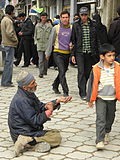Begging

Begging means asking people for money, food, shelter or other things, when one is not able to give anything instead. It is also referred to as sponging, spanging (short for "spare-changing") or (in American English) panhandling.
In larger cities, it is common to see beggars who ask for money, food, or other items. Typically, beggars often beg for spare change using coffee cups, mugs, small boxes, hats, or other items into which monies can be placed and sometimes display signs with messages such as "Help me. I'm homeless."
Use of funds obtained by begging
A 2002 study of 54 panhandlers in Toronto reported that of a median monthly income of $638 CAD, those interviewed spent a median of $200 CAD on food and $192 CAD on alcohol, tobacco and illegal drugs.[1] The Fraser Institute, however, criticized this study. They said there were many forms of begging including ones in which good money can be earned. They also said that panhandlers' reports were not reliable [2]
Because of this, some people say that it would be better to give the beggars gift cards or food/service vouchers, instead of money.[3] Some shelters also offer business cards with information on the shelter's location and services, which can be given instead of cash.[4]
Aggressive panhandling
Aggressive panhandling means to ask for donations or help in a threatening manner. This is not mugging, but rather similar and therefore often forbidden by law. Examples include:
Well known beggars
- Bampfylde Moore Carew self-styled King of the Beggars
- Nicholas Jennings in Thomas Harman's "Caveat for Common Cursitors"
- Ryan Larkin
- Eugene Kim (one of the homeless who hopes to pay his way through college by these means)
- Lazarus
- Omar
Begging Media
Beggar in the street of Nishapur, Iran, 2009
Begging directed at passing traffic, Denver, Colorado, 2018
Beggar in Uppsala, Sweden, 2014
Begging from visitors to a holy site, Sarnath, India, 2010
A street beggar in India reaches into a car (Calcutta Kolkata)
A kindness meter (below the red parking meter) in Ottawa, Ontario, Canada. The meter accepts donations for charitable efforts as part of an official effort to discourage panhandling.
Related pages
References
- ↑ Income and spending patterns among panhandlers, by Rohit Bose and Stephen W. Hwang.Bose, Rohit and Hwang, Stephen W. (2002-09-03). "Income and spending patterns among panhandlers". Canadian Medical Association Journal. pp. 167(5): 477–479. Archived from the original on 2013-08-01. Retrieved 2006-09-29.
{{cite web}}: CS1 maint: multiple names: authors list (link) - ↑ Bose/Hwang study "Begging for Data". CANSTATS. 3 September 2002. Archived from the original on 2006-04-20. Retrieved 2006-09-29.
- ↑ "Real Change, not Spare Change". Portland Business Alliance. Archived from the original on 2006-11-13. Retrieved 2006-09-30.
- ↑ Peace Studies Program. "Homelessness Contact Cards". George Washington University. Archived from the original on 2006-09-09. Retrieved 2006-09-30.
- ↑ Sudworth, John (2006-07-31). "Inquiry into 'beggar amputations'". BBC. Retrieved 2006-09-29.
Further material
- Born Losers: A History of Failure in America, by Scott A. Sandage (Harvard University Press, 2005).
| Wikimedia Commons has media related to Lua error in Module:Commons_link at line 62: attempt to index field 'wikibase' (a nil value).. |










